MGMT3015: Ethics, Corporate Strategy, and Social Responsibility
VerifiedAdded on 2023/04/20
|7
|1451
|55
Report
AI Summary
This report investigates the crucial role of ethics in corporate strategy, emphasizing the need for organizations to consider both competitive environments and social responsibility in every aspect of their business operations. The introduction highlights the ongoing ethical gaps in the business sector, using the Google case as a key example of unethical practices. The literature review delves into how ethics can be integrated into core business practices, exploring the importance of corporate governance and social responsibility in a globalized economy. It examines various theoretical frameworks, including stakeholder theory and corporate citizenship, while also addressing the significance of competition and the impact of ethical standards on public reputation and consumer loyalty. The conclusion emphasizes the importance of ethical strategies for sustainable business development. The report also references several academic papers and case studies to support its arguments, providing valuable insights for business managers.

[Date]
Corporate Level Strategy
[Document subtitle]
Student Name
institutional affiliation(S)
Corporate Level Strategy
[Document subtitle]
Student Name
institutional affiliation(S)
Paraphrase This Document
Need a fresh take? Get an instant paraphrase of this document with our AI Paraphraser
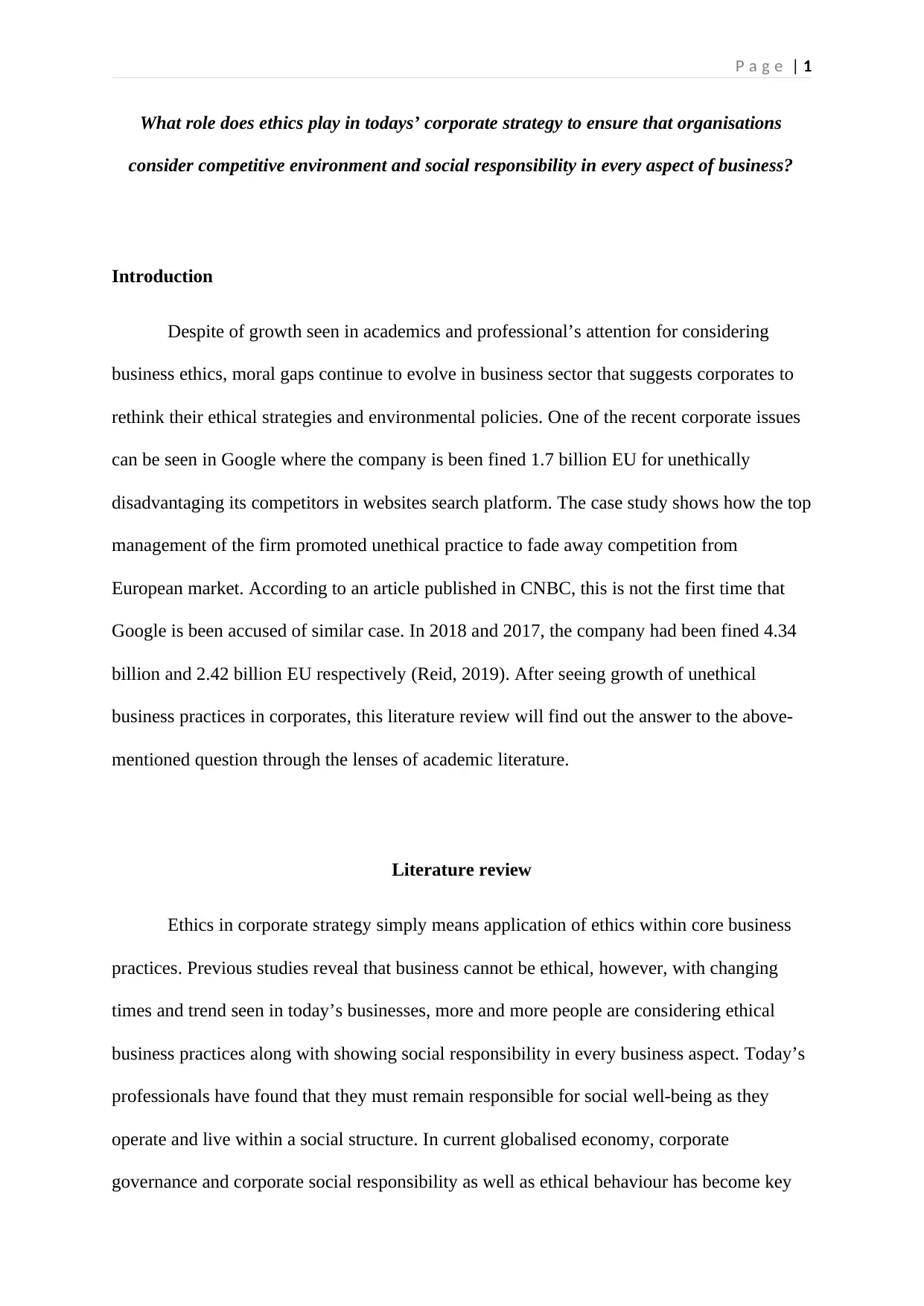
P a g e | 1
What role does ethics play in todays’ corporate strategy to ensure that organisations
consider competitive environment and social responsibility in every aspect of business?
Introduction
Despite of growth seen in academics and professional’s attention for considering
business ethics, moral gaps continue to evolve in business sector that suggests corporates to
rethink their ethical strategies and environmental policies. One of the recent corporate issues
can be seen in Google where the company is been fined 1.7 billion EU for unethically
disadvantaging its competitors in websites search platform. The case study shows how the top
management of the firm promoted unethical practice to fade away competition from
European market. According to an article published in CNBC, this is not the first time that
Google is been accused of similar case. In 2018 and 2017, the company had been fined 4.34
billion and 2.42 billion EU respectively (Reid, 2019). After seeing growth of unethical
business practices in corporates, this literature review will find out the answer to the above-
mentioned question through the lenses of academic literature.
Literature review
Ethics in corporate strategy simply means application of ethics within core business
practices. Previous studies reveal that business cannot be ethical, however, with changing
times and trend seen in today’s businesses, more and more people are considering ethical
business practices along with showing social responsibility in every business aspect. Today’s
professionals have found that they must remain responsible for social well-being as they
operate and live within a social structure. In current globalised economy, corporate
governance and corporate social responsibility as well as ethical behaviour has become key
What role does ethics play in todays’ corporate strategy to ensure that organisations
consider competitive environment and social responsibility in every aspect of business?
Introduction
Despite of growth seen in academics and professional’s attention for considering
business ethics, moral gaps continue to evolve in business sector that suggests corporates to
rethink their ethical strategies and environmental policies. One of the recent corporate issues
can be seen in Google where the company is been fined 1.7 billion EU for unethically
disadvantaging its competitors in websites search platform. The case study shows how the top
management of the firm promoted unethical practice to fade away competition from
European market. According to an article published in CNBC, this is not the first time that
Google is been accused of similar case. In 2018 and 2017, the company had been fined 4.34
billion and 2.42 billion EU respectively (Reid, 2019). After seeing growth of unethical
business practices in corporates, this literature review will find out the answer to the above-
mentioned question through the lenses of academic literature.
Literature review
Ethics in corporate strategy simply means application of ethics within core business
practices. Previous studies reveal that business cannot be ethical, however, with changing
times and trend seen in today’s businesses, more and more people are considering ethical
business practices along with showing social responsibility in every business aspect. Today’s
professionals have found that they must remain responsible for social well-being as they
operate and live within a social structure. In current globalised economy, corporate
governance and corporate social responsibility as well as ethical behaviour has become key
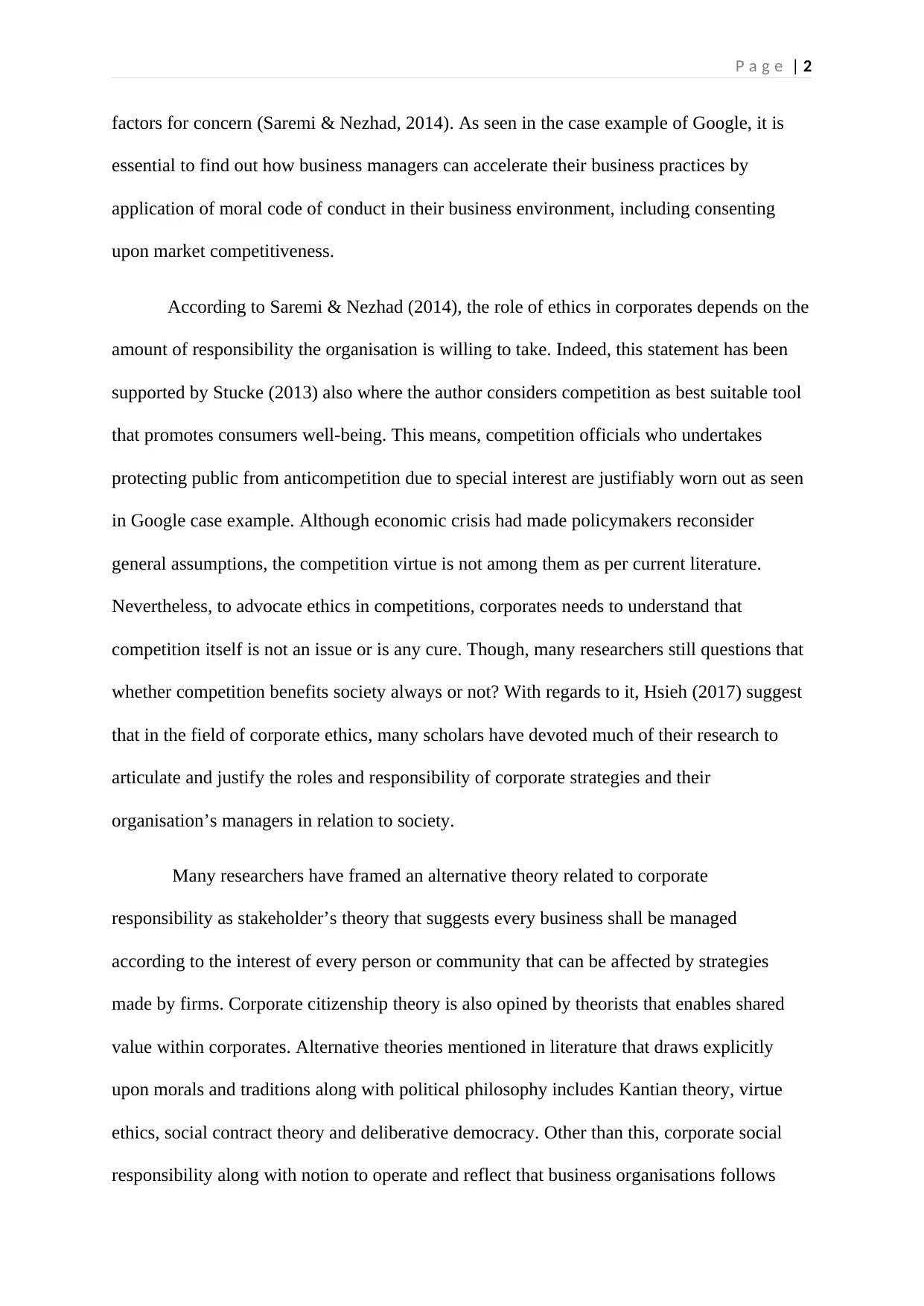
P a g e | 2
factors for concern (Saremi & Nezhad, 2014). As seen in the case example of Google, it is
essential to find out how business managers can accelerate their business practices by
application of moral code of conduct in their business environment, including consenting
upon market competitiveness.
According to Saremi & Nezhad (2014), the role of ethics in corporates depends on the
amount of responsibility the organisation is willing to take. Indeed, this statement has been
supported by Stucke (2013) also where the author considers competition as best suitable tool
that promotes consumers well-being. This means, competition officials who undertakes
protecting public from anticompetition due to special interest are justifiably worn out as seen
in Google case example. Although economic crisis had made policymakers reconsider
general assumptions, the competition virtue is not among them as per current literature.
Nevertheless, to advocate ethics in competitions, corporates needs to understand that
competition itself is not an issue or is any cure. Though, many researchers still questions that
whether competition benefits society always or not? With regards to it, Hsieh (2017) suggest
that in the field of corporate ethics, many scholars have devoted much of their research to
articulate and justify the roles and responsibility of corporate strategies and their
organisation’s managers in relation to society.
Many researchers have framed an alternative theory related to corporate
responsibility as stakeholder’s theory that suggests every business shall be managed
according to the interest of every person or community that can be affected by strategies
made by firms. Corporate citizenship theory is also opined by theorists that enables shared
value within corporates. Alternative theories mentioned in literature that draws explicitly
upon morals and traditions along with political philosophy includes Kantian theory, virtue
ethics, social contract theory and deliberative democracy. Other than this, corporate social
responsibility along with notion to operate and reflect that business organisations follows
factors for concern (Saremi & Nezhad, 2014). As seen in the case example of Google, it is
essential to find out how business managers can accelerate their business practices by
application of moral code of conduct in their business environment, including consenting
upon market competitiveness.
According to Saremi & Nezhad (2014), the role of ethics in corporates depends on the
amount of responsibility the organisation is willing to take. Indeed, this statement has been
supported by Stucke (2013) also where the author considers competition as best suitable tool
that promotes consumers well-being. This means, competition officials who undertakes
protecting public from anticompetition due to special interest are justifiably worn out as seen
in Google case example. Although economic crisis had made policymakers reconsider
general assumptions, the competition virtue is not among them as per current literature.
Nevertheless, to advocate ethics in competitions, corporates needs to understand that
competition itself is not an issue or is any cure. Though, many researchers still questions that
whether competition benefits society always or not? With regards to it, Hsieh (2017) suggest
that in the field of corporate ethics, many scholars have devoted much of their research to
articulate and justify the roles and responsibility of corporate strategies and their
organisation’s managers in relation to society.
Many researchers have framed an alternative theory related to corporate
responsibility as stakeholder’s theory that suggests every business shall be managed
according to the interest of every person or community that can be affected by strategies
made by firms. Corporate citizenship theory is also opined by theorists that enables shared
value within corporates. Alternative theories mentioned in literature that draws explicitly
upon morals and traditions along with political philosophy includes Kantian theory, virtue
ethics, social contract theory and deliberative democracy. Other than this, corporate social
responsibility along with notion to operate and reflect that business organisations follows
⊘ This is a preview!⊘
Do you want full access?
Subscribe today to unlock all pages.

Trusted by 1+ million students worldwide
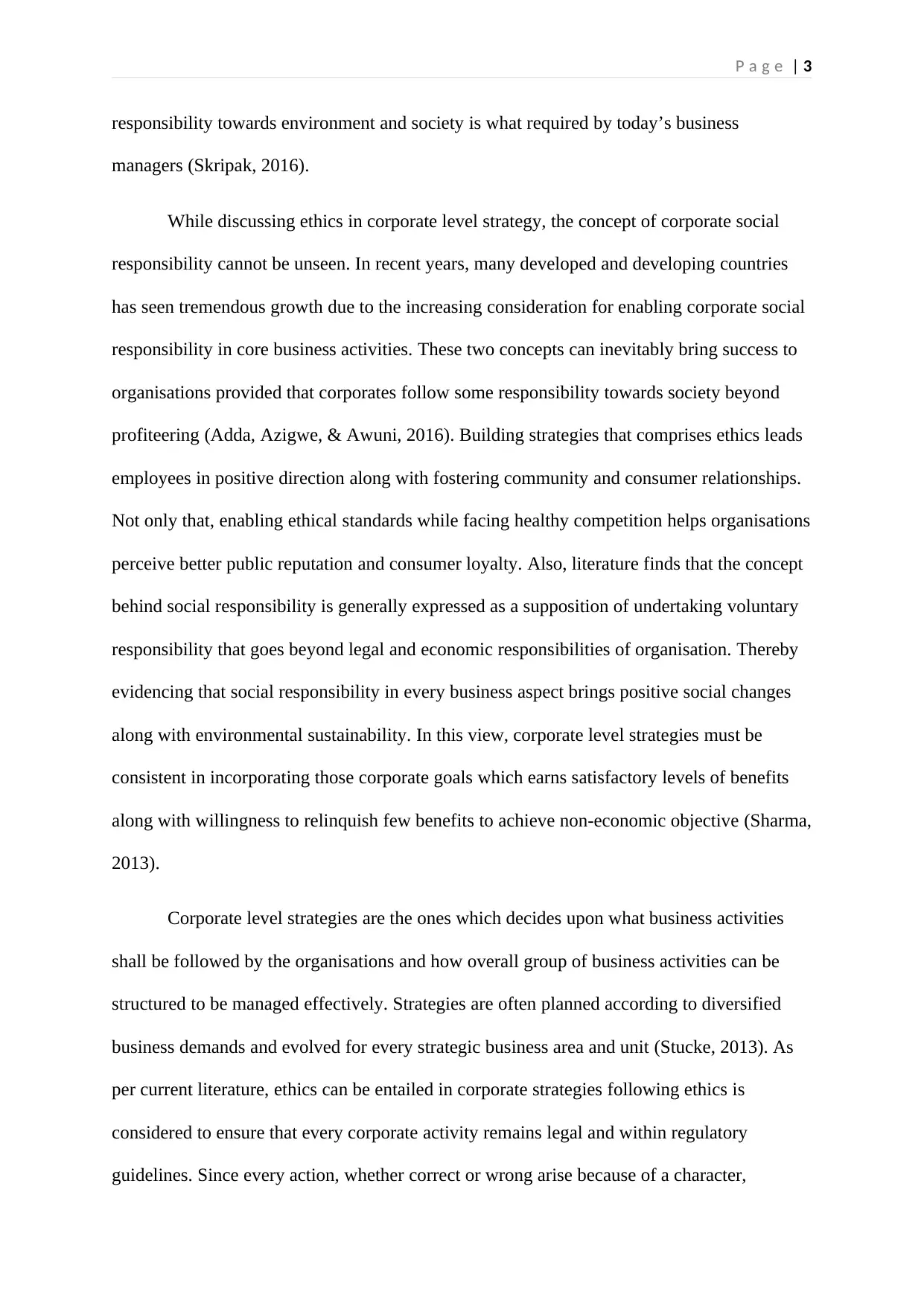
P a g e | 3
responsibility towards environment and society is what required by today’s business
managers (Skripak, 2016).
While discussing ethics in corporate level strategy, the concept of corporate social
responsibility cannot be unseen. In recent years, many developed and developing countries
has seen tremendous growth due to the increasing consideration for enabling corporate social
responsibility in core business activities. These two concepts can inevitably bring success to
organisations provided that corporates follow some responsibility towards society beyond
profiteering (Adda, Azigwe, & Awuni, 2016). Building strategies that comprises ethics leads
employees in positive direction along with fostering community and consumer relationships.
Not only that, enabling ethical standards while facing healthy competition helps organisations
perceive better public reputation and consumer loyalty. Also, literature finds that the concept
behind social responsibility is generally expressed as a supposition of undertaking voluntary
responsibility that goes beyond legal and economic responsibilities of organisation. Thereby
evidencing that social responsibility in every business aspect brings positive social changes
along with environmental sustainability. In this view, corporate level strategies must be
consistent in incorporating those corporate goals which earns satisfactory levels of benefits
along with willingness to relinquish few benefits to achieve non-economic objective (Sharma,
2013).
Corporate level strategies are the ones which decides upon what business activities
shall be followed by the organisations and how overall group of business activities can be
structured to be managed effectively. Strategies are often planned according to diversified
business demands and evolved for every strategic business area and unit (Stucke, 2013). As
per current literature, ethics can be entailed in corporate strategies following ethics is
considered to ensure that every corporate activity remains legal and within regulatory
guidelines. Since every action, whether correct or wrong arise because of a character,
responsibility towards environment and society is what required by today’s business
managers (Skripak, 2016).
While discussing ethics in corporate level strategy, the concept of corporate social
responsibility cannot be unseen. In recent years, many developed and developing countries
has seen tremendous growth due to the increasing consideration for enabling corporate social
responsibility in core business activities. These two concepts can inevitably bring success to
organisations provided that corporates follow some responsibility towards society beyond
profiteering (Adda, Azigwe, & Awuni, 2016). Building strategies that comprises ethics leads
employees in positive direction along with fostering community and consumer relationships.
Not only that, enabling ethical standards while facing healthy competition helps organisations
perceive better public reputation and consumer loyalty. Also, literature finds that the concept
behind social responsibility is generally expressed as a supposition of undertaking voluntary
responsibility that goes beyond legal and economic responsibilities of organisation. Thereby
evidencing that social responsibility in every business aspect brings positive social changes
along with environmental sustainability. In this view, corporate level strategies must be
consistent in incorporating those corporate goals which earns satisfactory levels of benefits
along with willingness to relinquish few benefits to achieve non-economic objective (Sharma,
2013).
Corporate level strategies are the ones which decides upon what business activities
shall be followed by the organisations and how overall group of business activities can be
structured to be managed effectively. Strategies are often planned according to diversified
business demands and evolved for every strategic business area and unit (Stucke, 2013). As
per current literature, ethics can be entailed in corporate strategies following ethics is
considered to ensure that every corporate activity remains legal and within regulatory
guidelines. Since every action, whether correct or wrong arise because of a character,
Paraphrase This Document
Need a fresh take? Get an instant paraphrase of this document with our AI Paraphraser
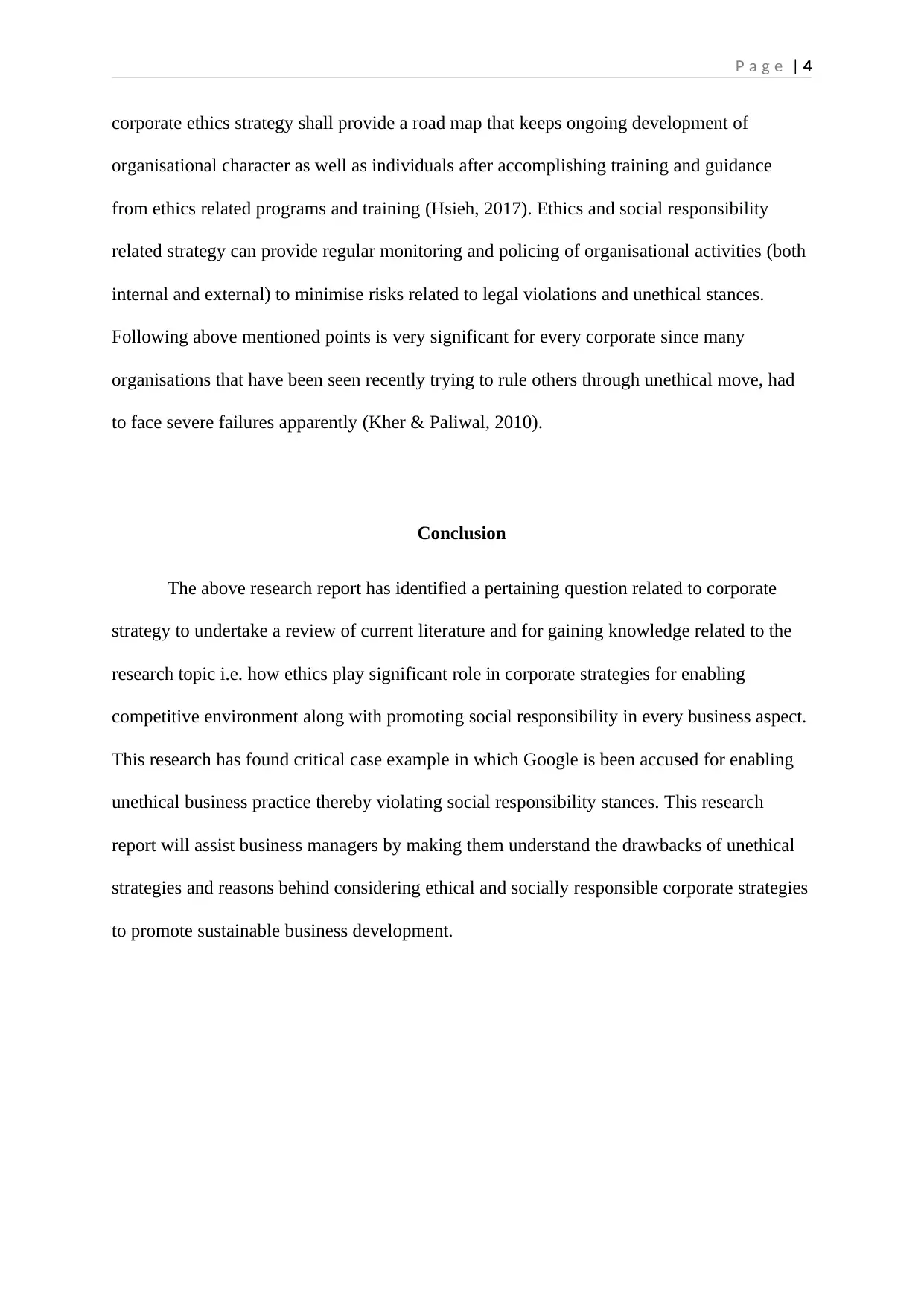
P a g e | 4
corporate ethics strategy shall provide a road map that keeps ongoing development of
organisational character as well as individuals after accomplishing training and guidance
from ethics related programs and training (Hsieh, 2017). Ethics and social responsibility
related strategy can provide regular monitoring and policing of organisational activities (both
internal and external) to minimise risks related to legal violations and unethical stances.
Following above mentioned points is very significant for every corporate since many
organisations that have been seen recently trying to rule others through unethical move, had
to face severe failures apparently (Kher & Paliwal, 2010).
Conclusion
The above research report has identified a pertaining question related to corporate
strategy to undertake a review of current literature and for gaining knowledge related to the
research topic i.e. how ethics play significant role in corporate strategies for enabling
competitive environment along with promoting social responsibility in every business aspect.
This research has found critical case example in which Google is been accused for enabling
unethical business practice thereby violating social responsibility stances. This research
report will assist business managers by making them understand the drawbacks of unethical
strategies and reasons behind considering ethical and socially responsible corporate strategies
to promote sustainable business development.
corporate ethics strategy shall provide a road map that keeps ongoing development of
organisational character as well as individuals after accomplishing training and guidance
from ethics related programs and training (Hsieh, 2017). Ethics and social responsibility
related strategy can provide regular monitoring and policing of organisational activities (both
internal and external) to minimise risks related to legal violations and unethical stances.
Following above mentioned points is very significant for every corporate since many
organisations that have been seen recently trying to rule others through unethical move, had
to face severe failures apparently (Kher & Paliwal, 2010).
Conclusion
The above research report has identified a pertaining question related to corporate
strategy to undertake a review of current literature and for gaining knowledge related to the
research topic i.e. how ethics play significant role in corporate strategies for enabling
competitive environment along with promoting social responsibility in every business aspect.
This research has found critical case example in which Google is been accused for enabling
unethical business practice thereby violating social responsibility stances. This research
report will assist business managers by making them understand the drawbacks of unethical
strategies and reasons behind considering ethical and socially responsible corporate strategies
to promote sustainable business development.
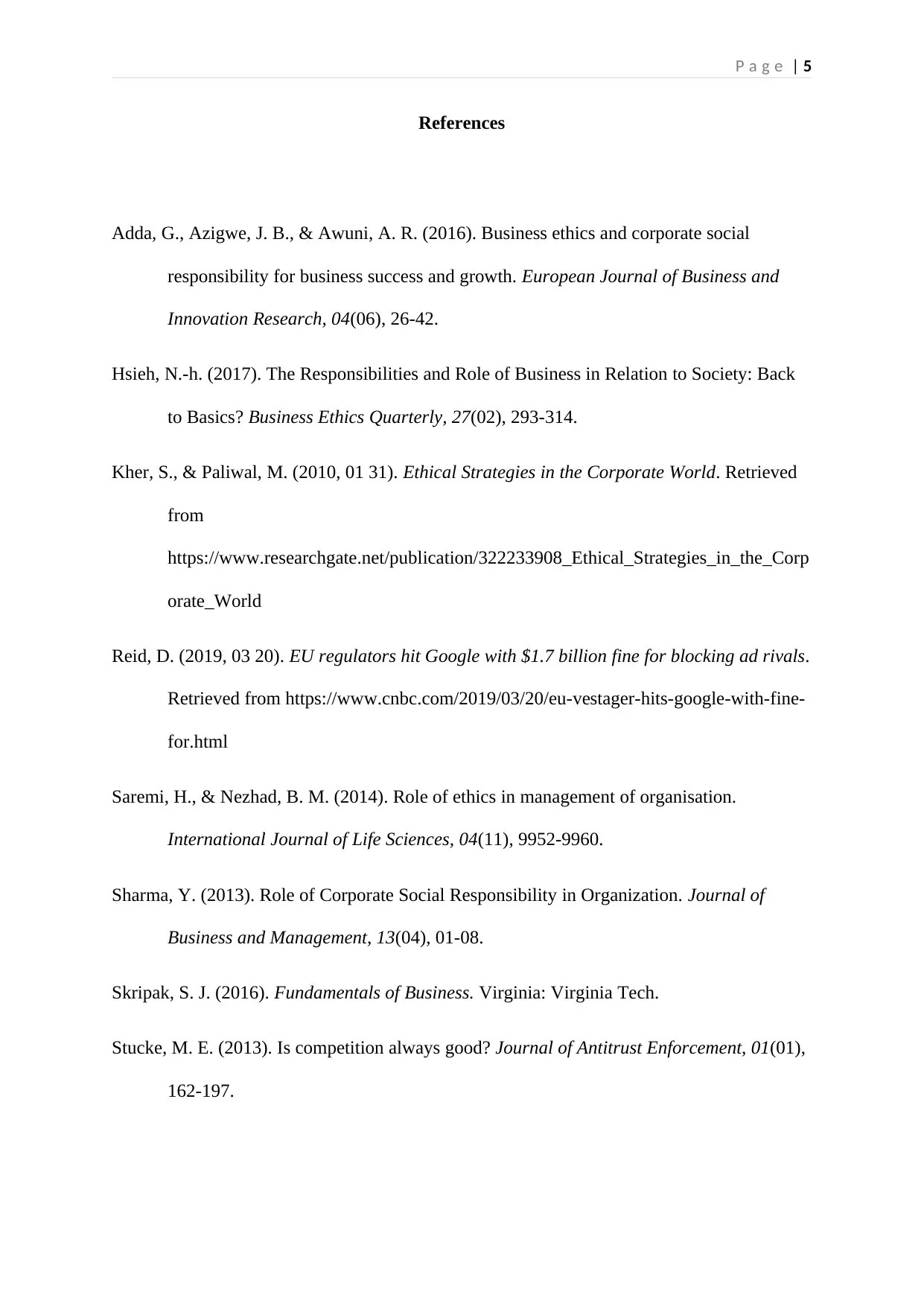
P a g e | 5
References
Adda, G., Azigwe, J. B., & Awuni, A. R. (2016). Business ethics and corporate social
responsibility for business success and growth. European Journal of Business and
Innovation Research, 04(06), 26-42.
Hsieh, N.-h. (2017). The Responsibilities and Role of Business in Relation to Society: Back
to Basics? Business Ethics Quarterly, 27(02), 293-314.
Kher, S., & Paliwal, M. (2010, 01 31). Ethical Strategies in the Corporate World. Retrieved
from
https://www.researchgate.net/publication/322233908_Ethical_Strategies_in_the_Corp
orate_World
Reid, D. (2019, 03 20). EU regulators hit Google with $1.7 billion fine for blocking ad rivals.
Retrieved from https://www.cnbc.com/2019/03/20/eu-vestager-hits-google-with-fine-
for.html
Saremi, H., & Nezhad, B. M. (2014). Role of ethics in management of organisation.
International Journal of Life Sciences, 04(11), 9952-9960.
Sharma, Y. (2013). Role of Corporate Social Responsibility in Organization. Journal of
Business and Management, 13(04), 01-08.
Skripak, S. J. (2016). Fundamentals of Business. Virginia: Virginia Tech.
Stucke, M. E. (2013). Is competition always good? Journal of Antitrust Enforcement, 01(01),
162-197.
References
Adda, G., Azigwe, J. B., & Awuni, A. R. (2016). Business ethics and corporate social
responsibility for business success and growth. European Journal of Business and
Innovation Research, 04(06), 26-42.
Hsieh, N.-h. (2017). The Responsibilities and Role of Business in Relation to Society: Back
to Basics? Business Ethics Quarterly, 27(02), 293-314.
Kher, S., & Paliwal, M. (2010, 01 31). Ethical Strategies in the Corporate World. Retrieved
from
https://www.researchgate.net/publication/322233908_Ethical_Strategies_in_the_Corp
orate_World
Reid, D. (2019, 03 20). EU regulators hit Google with $1.7 billion fine for blocking ad rivals.
Retrieved from https://www.cnbc.com/2019/03/20/eu-vestager-hits-google-with-fine-
for.html
Saremi, H., & Nezhad, B. M. (2014). Role of ethics in management of organisation.
International Journal of Life Sciences, 04(11), 9952-9960.
Sharma, Y. (2013). Role of Corporate Social Responsibility in Organization. Journal of
Business and Management, 13(04), 01-08.
Skripak, S. J. (2016). Fundamentals of Business. Virginia: Virginia Tech.
Stucke, M. E. (2013). Is competition always good? Journal of Antitrust Enforcement, 01(01),
162-197.
⊘ This is a preview!⊘
Do you want full access?
Subscribe today to unlock all pages.

Trusted by 1+ million students worldwide

P a g e | 6
1 out of 7
Related Documents
Your All-in-One AI-Powered Toolkit for Academic Success.
+13062052269
info@desklib.com
Available 24*7 on WhatsApp / Email
![[object Object]](/_next/static/media/star-bottom.7253800d.svg)
Unlock your academic potential
Copyright © 2020–2026 A2Z Services. All Rights Reserved. Developed and managed by ZUCOL.





